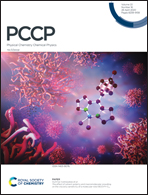How do mutations affect the structural characteristics and substrate binding of CYP21A2? An investigation by molecular dynamics simulations†
Abstract
Congenital adrenal hyperplasia (CAH) is one of the most frequent inborn errors of metabolism, inherited as an autosomal recessive trait. Above 95% of CAH cases are caused by mutations in cytochrome P450 21A2 (CYP21A2). It is a pity that how these mutations affect the structural characteristics and substrate binding of CYP21A2 is still unclear. To this end, molecular dynamics (MD) simulations and binding free energy calculations are performed to investigate the effects of single point mutations (L108R, G292C, G292S, G293D, and T296N) in CYP21A2. The results indicate that mutations could cause the local conformational changes of CYP21A2, affecting the substrate binding by changing the interaction between the protein and heme, changing the charge environment of residues, or introducing steric hindrance. In addition, our work gives a wonderful explanation of the phenomenon that though the substrate binding ability increases, the reaction activity decreases in T296N. The present study provides detailed atomistic insights into the structure–function relationships of CYP21A2, which could contribute to further understanding about 21-hydroxylase deficiency and also provide a theoretical basis for CAH prediction and treatment.

- This article is part of the themed collection: PCCP Editor’s Choice, 2020


 Please wait while we load your content...
Please wait while we load your content...